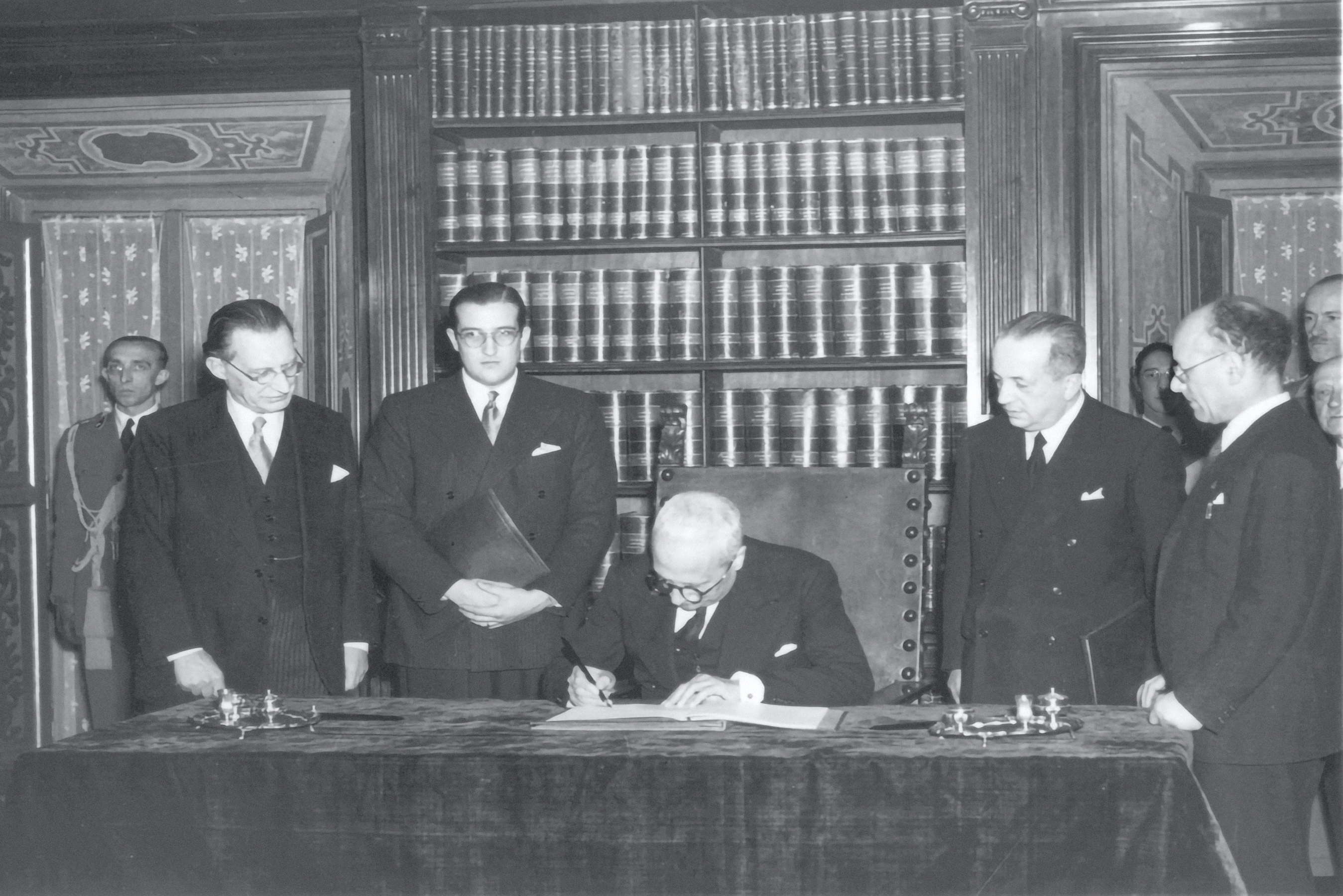1. Early Life and Education
Enrico De Nicola was born in Naples, Campania, then part of the Kingdom of Italy, on 9 November 1877. He came from a family with a background in law, as his father was a lawyer. De Nicola pursued his legal education at the University of Naples Federico II, where he graduated in 1896. He quickly gained recognition as a highly respected penal lawyer in Italy, establishing a reputation for his legal acumen.
2. Early Political Career
De Nicola's political career began with his election as a deputy for the Liberal Party in 1909. He was re-elected in 1913 and continued to serve in the Chamber of Deputies until 1921. During this period, he held several minor governmental posts. He served as the Under-Secretary of State for the Colonies in the government led by Giovanni Giolitti from November 1913 to March 1914. Later, he was appointed Under-Secretary of State for the Treasury in the cabinet of Vittorio Emanuele Orlando from January to June 1919. A significant highlight of his early political career was his election as Speaker of the Chamber of Deputies on 26 June 1920, a position he held until January 1924.
3. Activity during Fascism
With the rise of Fascism in Italy and the establishment of Benito Mussolini's regime, Enrico De Nicola chose to withdraw from active political life. Despite his retirement from the political scene, he was appointed a senator by King Victor Emmanuel III in 1929. However, De Nicola firmly refused to take his seat in the Senate and never participated in the workings of the Assembly during the Fascist era, effectively remaining in a state of semi-retirement. He focused instead on his law practice.
4. Role in the Establishment of the Republic
De Nicola re-engaged with politics following the fall of Italian Fascism in 1943. He emerged as a crucial and influential mediator during the complex post-Fascist transition period. When King Victor Emmanuel III sought to distance the monarchy from its collaboration with the Fascist regime, De Nicola played a key role in the creation of the title "Lieutenant-General of the Realm" for the king's son, Prince Umberto, who then assumed most of the sovereign's functions.
After the constitutional referendum in 1946 resulted in the abolition of the monarchy and the establishment of the Italian Republic, a new Constituent Assembly was elected. Following the exile of Umberto II, Prime Minister Alcide De Gasperi briefly served as acting head of state. On 28 June 1946, the Constituent Assembly elected De Nicola as the Provisional Head of State, securing a significant 80% of the votes in the first round.
Despite this overwhelming support, De Nicola, known for his profound modesty and humility, was initially hesitant to accept the nomination. He underwent frequent changes of mind, prompting Giulio Andreotti, who would later become Prime Minister, to famously appeal to him in Il Giornale d'Italia with the phrase: "Your Excellency, please, decide to decide if you can accept to accept...."
On 25 June 1947, De Nicola resigned from his post, citing health reasons. However, recognizing his nobility and integrity, the Constituent Assembly immediately re-elected him the very next day, a testament to the high regard in which he was held.

5. First President of Italy
Upon the official enactment of the Constitution of Italy on 1 January 1948, Enrico De Nicola was formally named the "President of the Italian Republic", thus becoming the first President in the nation's republican history. His term as President was brief, lasting until 12 May 1948.
Despite his widely respected tenure, De Nicola ultimately declined to be a candidate for the first constitutional presidential election held in May 1948, again citing health concerns. Consequently, Luigi Einaudi was elected as his successor to the Quirinal Palace, the official residence of the Italian presidency.
6. Later Public Office and Activities
Even after his presidency, Enrico De Nicola continued to serve the Italian Republic in various capacities. In 1948, as a former Head of State, he became a senator for life, a position granted to ex-presidents. His commitment to public service led him to further high offices. He was elected President of the Senate on 28 April 1951, serving until 24 June 1952. Later, he was also elected President of the Constitutional Court, holding this esteemed legal position from 23 January 1956 to 26 March 1957.
7. Personal Life
Enrico De Nicola maintained a private personal life. He was unmarried and had no children. An anecdote from his personal life suggests he had a fondness for pizza, and it was noted that he would always choose to sit near the oven when dining.
8. Honours and Awards
Enrico De Nicola received several significant honours recognizing his contributions to Italy:
- Order of the Star of Italian Solidarity
- Order of Merit of the Italian Republic (1956)
9. Assessment and Legacy
Enrico De Nicola is remembered for his distinctive character traits, particularly his profound modesty, humility, and integrity. His initial hesitation to accept the provisional head of state position and his subsequent resignation, only to be re-elected, highlighted his noble and selfless approach to public office. He was a figure of great moral authority, earning the trust and respect of political leaders across the spectrum.
De Nicola's legacy is intrinsically linked to the establishment of the Italian Republic. As a crucial mediator during the post-Fascist transition and the first provisional and then formal President, he provided stability and legitimacy to the nascent democratic institutions. His commitment to the rule of law, combined with his unassuming nature, helped lay a strong foundation for Italy's new republican era.
10. Death
Enrico De Nicola died on 1 October 1959, in Torre del Greco, a municipality in the province of Naples, at the age of 81.
